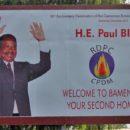Reconsidering Sanctions in South Sudan – By Alex de Waal

 Sanctions against spoilers can work if there is an effective and legitimate peace process. There is no such process in South Sudan today. Threats of force and sanctions by IGAD leaders are mere gestures of frustration, not components of a workable peace.
Sanctions against spoilers can work if there is an effective and legitimate peace process. There is no such process in South Sudan today. Threats of force and sanctions by IGAD leaders are mere gestures of frustration, not components of a workable peace.
However, sanctions could serve another purpose: fighting corruption. This is a worthwhile goal in itself and would also help a genuine peace.
Frustration, impatience and anger are perfectly understandable responses to the ongoing civil war in South Sudan. IGAD heads of state have met seven times in the last twelve months””a level of high-level attention without precedent””but they are not getting their way.
The ceasefire has been flouted, civilians are attacked, and there is no sign that the parties to the talks are acting in good faith. In response, the mediators have issued threats. This is silly: South Sudan’s leaders have too long an experience of defying threats, or waiting them out, to be intimidated easily.
Meeting in Addis Ababa on 6-7 November, the IGAD heads of state issued resolutions that included threat of asset freezes, travel bans and an arms embargo. Building on the deployment of armed battalions from IGAD countries as a de facto enforcement arm of UNMISS, the leaders went on to declare: “˜The IGAD region shall, without further reference to the warring Parties, take the necessary measures to directly intervene to protect life and to restore peace and stability.’[i]
A unilateral forcible intervention of the kind threatened by IGAD would be illegal unless it were endorsed by the UN Security Council. With the backing of the P3″”the U.S., Britain and France””and the likelihood that China and Russia would support any course of action supported by the African Union, such authorization might well be forthcoming.
But would it be wise? Would the neighbouring states have any more success in military enforcement of their will on South Sudanese armed groups, than Khartoum did over many decades?
More likely, I suggest, is that any attempt to carry out this threat would result in the neighbouring countries becoming embroiled as belligerents in South Sudan’s civil war.
The region’s leaders will probably not be so foolish as to do this. But they are trapping themselves by ratcheting up the rhetoric. Having rattled this sabre, they may find themselves in the mediators’ nightmare””compelled to do something that they know won’t work, just to rescue their own credibility.
The least bad thing to do in these circumstances is to implement lesser measures: sanctions and an arms embargo.
The arms embargo is important. Especially because the likely violators of the embargo include neighbouring countries themselves, so implementing an embargo would demand greater consensus and political will than we have seen to date. That is a very good reason to champion an embargo: it would at minimum expose any neighbour playing a negative role, and better still reduce any such interference.
What of individually-targeted sanctions, including travel bans and asset freezes? In principle they might be good instruments. Most South Sudanese leaders travel abroad regularly, including to IGAD countries, and many have assets held in those countries and further afield.
Moreover, because South Sudan’s kleptocrats never thought that they might be targeted by countries they considered friends, they didn’t take many precautions when they invested in real estate abroad or stashed away their illicit gains.
International financial sleuthing has developed sophisticated tools to deal with other rogue governments that have better-developed mechanisms for hiding money than South Sudan. A sanctions committee supported by the U.S. would find it relatively easy to locate the many billions of dollars that are believed to have been fraudulently acquired and taken out of the country.
Sanctions against South Sudanese leaders are technically viable and would certainly be a workable tool for arm-twisting or punishing members of the elite.
But to what purpose? We should not confuse tactics with strategy. Hurting political and military leaders is not a valid goal in itself. What does IGAD want to achieve beyond symbolic action?
If the goal is to isolate and weaken spoilers in a peace process, that can work only if the peace process itself has a clear strategy and enjoys popular legitimacy within South Sudan. At the moment, the IGAD peace process has neither.
Most South Sudanese see it as an attempt to patch up a deal””a sharing of the spoils””among the same leaders who failed the country. So they would regard any attempt to single out any given politician or commander for sanctions, while overlooking others, as an arbitrary decision taken for narrow political reasons.
Imposing sanctions without an effective and legitimate peace process is therefore putting the cart before the horse. Any such sanctions would have no political horsepower and would just undermine the standing of those who imposed them. Once there is a peace agreement that commands popular support, sanctioning those who remain outside it would be a different story””but there is no sign of that at the moment.
However, this does not mean we should write off sanctions altogether. It is worth considering what kind of measures would be appropriate, regardless of whether or not there is a viable peace process.
Let me suggest one: sanctions to attack corruption. I have argued elsewhere that this lies at the heart of South Sudan’s crisis.[ii]
Irrespective of corruption’s contribution to war, it is simply wrong and should be stopped. The great achievement of anti-corruption campaigners in South Sudan has been to raise awareness of the issue, and make fighting corruption a popular and legitimate cause.
The Government of South Sudan clearly does not have the capacity to investigate and prosecute corruption cases, not least because so many illicit transactions have occurred outside the country, and the funds and assets acquired are beyond its reach.
A hybrid mechanism of South Sudanese and international investigators might be set up for this purpose, bringing cases in whatever jurisdiction is appropriate. Perhaps any illicit funds thereby seized could be paid into a fund to compensate victims of war and atrocities.
Another mechanism would attack a major and growing source of corruption: land grabbing. A commission to review the legality of all large-scale land acquisitions since 2011″”or perhaps since 2005″”would be a simple step.
It would deter both local and foreign land-grabbers, who would fear that any land acquisitions would be suspended or reversed””and they would never recover their payments. Whether the land-grabbing payments are used to fund war-making or private profit is immaterial: they are dispossessing South Sudanese of their birthright, and are plain wrong.
A third option to consider is stopping “˜blood teak’: the illicit logging that is stealing one of South Sudan’s most precious resources. Again, it does not matter whether the monies paid for exporting the country’s irreplaceable teak forests are used for warlordism or plain old fashioned theft: it should be stopped.
And if these measures””and other anti-corruption efforts””are undertaken seriously, then it might change the dynamic of the peace process. It would signal that the loot-fest that has been government in South Sudan is coming to an end.
Alex de Waal is Director of the World Peace Foundation.
[i] Resolutions of the 28th Extraordinary Summit of the IGAD Heads of State and Government, Addis Ababa, 7 November 2014, paragraph 4.
[ii] Alex de Waal, “˜When kleptocracy becomes insolvent: Brute causes of the civil war in South Sudan,’ African Affairs, (2014) 113/452: 347-369.





Dear Alex, it is always inspiring your passion for the Sudans. Please allow to state my opinion on your article.
It is true that the peace process in Addis is about division of power between the parties that caused the war. Personally I want to see an immediate end to violence. This means any agreement that will transform the conflict into a non violent political struggle inside South Sudan is much acceptable. Any argument about the legitimacy of process feeds into the two parties’ intention to prolong. This is what the discuss at the beginning of the peace talks. We just need peace.
Secondly, experts should not divert the intention of IGAD peace led process. Fighting corruption, or land grabbing and other issues are important but these can only occur secure stable country, after a peace agreement. You cannot carry out investigations in volatile situation in South Sudan.
Seek Ye First Peace and the rest will follow.
It is difficult to propose any recommendation in South Sudan given the history, but definitely something must be done at the regional/international level; however, as you suggest, it must have some semblance of local authenticity and direction. While IGAD may not have the most legitimacy in SS at the moment, it does have some authority at the continental level, and the wider international community will want to avoid any solutions looking like a “Western” coalition.
I think if IGAD went forward with your recommendations, it would be a positive and effective first step; but, recalling the oil shut off in the recent past, one wonders what the Big Men won’t do to stay/get in power – even if it impacts their own back accounts.
The thing to remember is that the U.N. is just an advisory body. It has no authority within a sovereign nation.